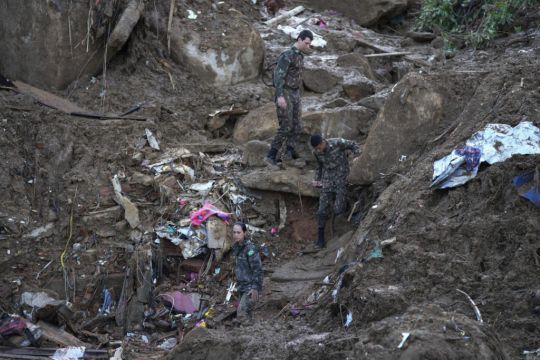The death toll from floods and landslides that swept down on the Brazilian mountain city of Petropolis has risen to at least 113, with 116 people still unaccounted for.
The Rio de Janeiro state government confirmed the increasing loss of life, with many feared buried in mud beneath the German-influenced city nestled in the mountains above the city of Rio de Janeiro.
Torrents of floodwaters and mudslides dragged cars and houses through the streets of the city on Tuesday during the most intense rainfall in decades.
One video showed two buses sinking into a swollen river as its passengers clambered out of the windows, scrambling for safety. Some did not make it to the banks and were washed away.

Survivors dug through the ruined landscape to find loved ones even as more landslides appeared likely on the city’s slopes.
As evening came, heavy showers returned to the region, sparking renewed concern among residents and rescue workers. Authorities insisted those living in at-risk areas should evacuate.
Rosilene Virginia said her brother barely escaped, and she considers it a miracle, but a friend has not yet been found.
“It’s very sad to see people asking for help and having no way of helping, no way of doing anything,” Ms Virginia told The Associated Press as a man comforted her. “It’s desperate, a feeling of loss so great.”
As some people tried to clear away mud, others began burying lost relatives, with 17 funerals at the damaged cemetery.
Rio police said in a statement on Thursday that about 200 agents were checking lists of the living, the dead and the missing by visiting checkpoints and shelters, as well as the city’s morgue. They said they managed to remove three people from a list of missing after finding them alive in a local school.
“Every detail is important so we can track people,” said Rio police investigator Elen Souto. “We need people to inform the full name of the missing person, their ID, physical traits and the clothes that person was wearing.”

Petropolis, named after a former Brazilian emperor, has been a refuge for people escaping the summer heat and tourists keen to explore the so-called “Imperial City”.
Its prosperity has also drawn residents from Rio’s poorer regions and the population grew haphazardly, climbing mountainsides now covered with small residences packed tightly together, often in areas made more vulnerable by deforestation and inadequate drainage.
The state fire department said 25.8cm of rain fell within three hours on Tuesday – almost as much as during the previous 30 days combined. Rio de Janeiro’s Governor Claudio Castro said in a press conference that the rains were the worst Petropolis has received since 1932.
“No one could predict rain as hard as this,” Ms Castro said. More rain was expected through the rest of the week, according to weather forecasters.







